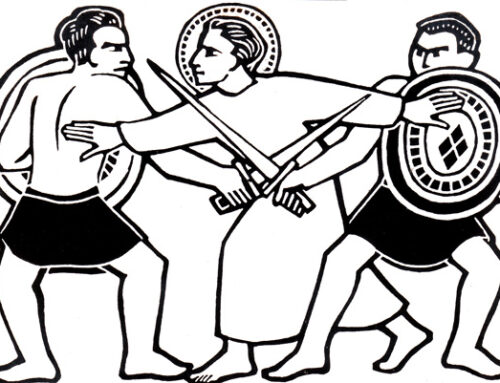Education: Increasing Knowledge
December 4, 2016
Categories: Justice
This blog post is Part 10 in a 12-part blog series on Christianity and justice. (If you missed the first post, you can find it here.) As you begin with an attitude of humility, and do some thinking and exploring about what problems or injustices tug at your heart the most, what is the next step? Before jumping in and doing something, it is important to get educated.
One thing I find fascinating about the life of Jesus is that he didn’t begin his ministry until he was about 30-years-old. What was he doing before then? The Bible doesn’t say too much about it. The book of Luke tells a story of Jesus at age 12, sitting among the teachers in the temple courts, listening to them and asking questions (Luke 2:46). After this story, Luke gives us just one verse about the rest of Jesus’ growing up years: And Jesus grew in wisdom and stature, and in favor with God and man (Luke 2:52).
What is clear is that by the time Jesus begins his ministry at age 30, he is an impressive rabbi and teacher, and he ends up having a huge impact in his three years of ministry. We don’t know for sure what Jesus was doing during his growing up years, but my guess is that he kept doing what we see him doing in Luke chapter 2—studying and learning the Scriptures. In other words, Jesus didn’t jump right into his work and ministry. He prepared. In the same way, it is important for us to prepare for our justice work.
For most problems, the fight for justice has been going on for quite some time. Before doing anything, it is important to take stock and educate yourself about the issue, as well as the things that people are currently doing in your area to work toward justice.
To begin, read some books and journal articles about the issue. Try to read multiple sources from authors who hold different opinions about the issue. You don’t just want to read one side of the story, because you want to understand the issue fully. You need to understand the barriers that hold people back from working toward justice in this area. Don’t just read books and articles that support your view and make you feel good—read books and articles that oppose your view and make you feel uncomfortable. Also, it can be helpful to watch documentaries about the issue you are trying to learn more about. Again, don’t just watch documentaries from one point of view—watch various documentaries if they are available, to try and get a full picture of the issue.
After doing your background reading on the issue, do some research on what is already being done in your state, city, and community about this issue. For example, are there organizations that work for justice in your community? If so, what kinds of activities are they already doing? Read their websites and see what they are up to. If they have events or meetings, show up, meet people, and ask questions. Get a sense of what is already being done, and what the most important needs are.
When you are educated about an issue, you can help in an informed, productive way, in coordination with others who are working toward the same goal. Your energy will be focused, like a laser beam. If you don’t start with education, your efforts are likely to be random. You may or may not actually be helping, and there is a chance you might make things worse.
Discussion: What is one step you could take to become more educated about the issue you are passionate about?
Click here to read Part 11: Relationship, Developing Connections
Related Thoughts
No Comments
Leave A Comment

Subscribe To My Newsletter
Join my mailing list to receive the latest blog posts.
Receive my e-book “The Mental Health Toolkit” for free when you subscribe.






Thank you for your dream article
[…] missed the first post, you can find it here.) After doing some background reading and research to get educated on the issue you are passionate about, the next step is to develop relationships and make connections with other people working on the […]